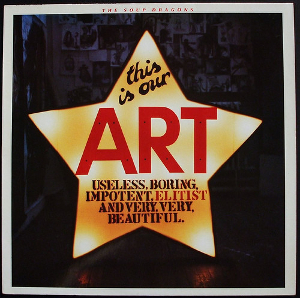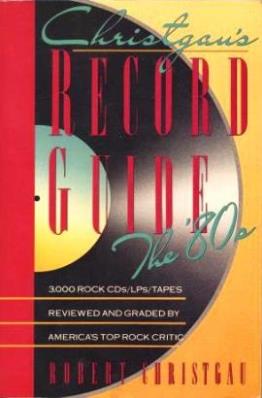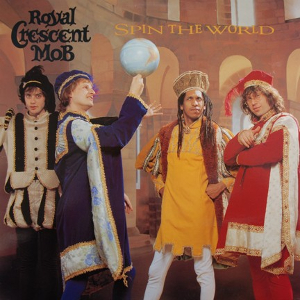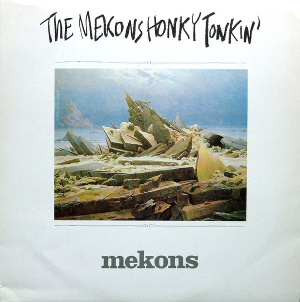
Pink Flag is the debut album by the English rock band Wire, released in November 1977. The album was critically acclaimed on release, and has since been highly influential. It is widely regarded as a landmark in the development of post-punk music.

Dub Housing is the second album by American rock band Pere Ubu. Released in 1978 by Chrysalis Records, the album is now regarded as one of their best, described by Trouser Press as "simply one of the most important post-punk recordings."

Smell the Magic is the second studio album by American rock band L7, released in 1990 by Sub Pop. Originally issued as a 12" EP containing only the first six songs, it was reissued on CD in July 1991, expanded to album length with three more tracks: "Packin' a Rod," "Just Like Me," and "American Society." The opening track "Shove" was released as the band's first single.

Distant Plastic Trees is the debut studio album by American indie pop band The Magnetic Fields, released in 1991. Lead vocals on the album are performed by Susan Anway.
The Pooh Sticks were a Welsh indie pop band from Swansea, Wales, primarily recording between 1988 and 1995. They were notable for their jangly melodiousness and lyrics gently mocking the indie scene of the time, such as on "On Tape", "Indiepop Ain't Noise Pollution" and "I Know Someone Who Knows Someone Who Knows Alan McGee Quite Well". The band changed direction on their 1991 U.S breakthrough The Great White Wonder, eschewing the 'twee' British indie pop sound for a more American-styled power pop sound, akin to bands such as Jellyfish and Redd Kross. Subsequent albums included Million Seller, released on 11 January 1993, considered by some power pop fans to be the band's best work, and Optimistic Fool, released on 24 April 1995, followed in this style.

Hunkpapa is the third studio album by Throwing Muses, released in 1989. It peaked at number 59 on the UK Albums Chart.

Smash Your Head on the Punk Rock is a compilation album by the American indie rock band Sebadoh. It was released in 1992, and marked the band's debut on Sub Pop.

Hard Line is the fourth album by the American roots rock band the Blasters, released in 1985. Dave Alvin quit the band shortly after the album's release. The album peaked at No. 86 on the Billboard 200.

Envy is the debut album by Ambitious Lovers. It was released in 1984 through E.G. Records. The album marked the first entry in what, at one point, was supposed to be a seven-album series on the seven deadly sins.

American Grafishy is the third studio album by the San Francisco-based punk rock band Flipper. It was released in 1992 by Def American; label president Rick Rubin had once been in a Flipper tribute band. The album title is a pun on the coming-of-age film American Graffiti. The band promoted the album with a North American tour.

The Great White Wonder is the second full-length album by the Welsh band The Pooh Sticks. The album was released in June 1991 and is the band's final album release on an independent label before signing to RCA Records in 1992. The album features guest vocals from Amelia Fletcher.

This Is Our Art is the debut studio album by the Scottish band the Soup Dragons, released in 1988.

Christgau's Record Guide: The '80s is a music reference book by American music journalist and essayist Robert Christgau. A follow-up to Christgau's Record Guide: Rock Albums of the Seventies (1981), it was published in October 1990 by Pantheon Books.
Love Child was a New York City-based alternative rock band whose music combined elements of punk rock and no wave. According to Trouser Press's David Sprague, Love Child was "...one of Gotham's most mercurial bands, able to leap from twee pop tunes to galvanizing skronkadelic constructs in a single bound."

Spin the World is an album by the American band Royal Crescent Mob, released in 1989. It was the band's major label debut. They supported the album with a North American tour.

Kabu is the second album by the Ethiopian singer Aster Aweke. It was released in 1991 via Columbia Records.

Contenders is the debut album by the English band Easterhouse, released in 1986.

It's Alright is an album by the American musician Chris Stamey, released in 1987. Stamey supported it with a North American tour that included Alex Chilton on keyboards. It's Alright was expected to be somewhat of a mainstream success; it did not perform as well as envisioned, and Stamey was dropped from A&M Records two years after its release.

The Mekons Honky Tonkin' is an album by the British band the Mekons, released in 1987. It was their first album to be released in the United States and the band's third country music-influenced album. The band supported the album with a North American tour.

Center of the Universe is an album by the American band Giant Sand, released in 1992. It was the first Giant Sand album to receive wide distribution and a traditional promotional campaign. It was also the band's first album for Restless Records, which had rereleased a couple of older Giant Sand albums. The band supported Center of the Universe with a North American tour.


















